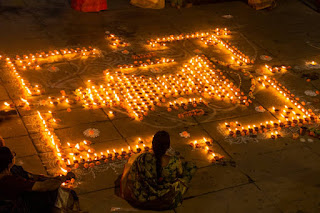The Radiant Festival of Lights - Diwali: History, Traditions, and Significance
Diwali, also known as the "Festival of Lights," is one of India's most celebrated and cherished festivals, marked by vibrant lights, splendid decorations, family gatherings, and grand festivities. Beyond the lights and festivities, Diwali has a profound cultural, religious, and historical significance. This blog explores Diwali's origins, the fascinating stories behind it, the customs that have shaped it, and its continued significance in modern times.
The Origins of Diwali - How It All Began
1.1 Historical Background of Diwali
Diwali's origins are deeply rooted in Indian mythology, with references in ancient Hindu texts such as the Ramayana and Mahabharata. It is primarily associated with the return of Lord Rama, an avatar of the god Vishnu, to his kingdom of Ayodhya after 14 years in exile and the victory over the demon king Ravana. The people of Ayodhya welcomed Rama by lighting earthen lamps, known as
.jpg) |
| Diyas, symbolizing the triumph of light over darkness |
1.2 The Mahabharata Connection
In some regions, Diwali is also celebrated as the day Pandavas returned to their kingdom after 13 years in exile, as described in the Mahabharata. This return symbolized victory, resilience, and a celebration of justice, a sentiment that continues to resonate in Diwali celebrations today.
The Purpose of Diwali - A Festival with Deep Symbolism
2.1 The Symbolism of Light and Darkness
Diwali embodies the universal concept of the victory of light over darkness, good over evil, and knowledge over ignorance. The lighting of diyas, lanterns, and candles symbolizes the illumination of one’s inner self, filling lives with hope and positivity.
Diwali is not only a Hindu festival but also holds significance for other religions in India. For Jains, Diwali marks the spiritual liberation (nirvana) of Lord Mahavira. Sikhs celebrate it as Bandi Chhor Divas, the day Guru Hargobind Ji was freed from Mughal imprisonment. Buddhists also celebrate Diwali, particularly in regions like Ladakh, where it marks the establishment of harmony.
Section 3: Traditions and Rituals of Diwali
3.1 Dhanteras - The Beginning of Diwali Celebrations
Diwali officially begins with Dhanteras, where people clean their homes and make purchases of gold, silver, or household items to bring prosperity. It’s believed that Goddess Lakshmi, the goddess of wealth, showers her blessings on this day.
 |
| Shopping on Dhanteras - welcoming prosperity |
3.2 Naraka Chaturdashi
The second day is Naraka Chaturdashi, or Choti Diwali, which symbolizes the cleansing of the self and one’s surroundings. The legend of this day recounts the story of Lord Krishna defeating the demon Narakasura, symbolizing the removal of evil.
The Main Day of Diwali - Worship, Celebration, and Joy
4.1 Lakshmi Puja
The main day of Diwali is dedicated to worshiping Goddess Lakshmi. Families gather to perform puja (prayer), praying for health, wealth, and prosperity in their homes. The houses are decorated with beautiful rangoli (colorful art) and flowers, and the ambiance is filled with the aroma of incense and sweets.
4.2 Family Gatherings and Feasts
Diwali is a time when families come together, share meals, and celebrate with delicious sweets like laddus, barfis, and other treats. Children enjoy bursting firecrackers (though there is growing awareness about eco-friendly celebrations).
Govardhan Puja and Bhai Dooj - Extending the Festivities
5.1 Govardhan Puja
The day following Diwali is known as Govardhan Puja. This ritual celebrates the tale of Lord Krishna lifting the Govardhan hill to protect villagers from heavy rains, symbolizing humanity's duty to respect and protect nature.
 |
| Bhai Dooj - celebrating sibling love |
5.2 Bhai Dooj - Celebrating Sibling Bond
The last day of Diwali is Bhai Dooj, dedicated to the bond between brothers and sisters. Sisters pray for their brothers' well-being, and brothers promise to protect their sisters.
Diwali in the Modern Era - An Everlasting Celebration
6.1 Eco-friendly Diwali Initiatives
With rising awareness about environmental concerns, people are embracing eco-friendly celebrations, using biodegradable decorations, minimizing firecrackers, and promoting green celebrations.
 |
| Diwali celebration |
6.2 Global Celebration of Diwali
Diwali has gained international recognition and is celebrated in countries like the USA, UK, Canada, and more. Events in major cities showcase Indian culture, featuring rangoli competitions, dance performances, and more, making Diwali a global festival.
Conclusion: Diwali - A Timeless Celebration of Light and Love
Diwali is more than just a festival; it is an occasion that transcends generations, geographical boundaries, and cultural differences. This celebration of light over darkness continues to inspire people worldwide to embrace joy, peace, and prosperity. Diwali serves as a reminder of the resilience of goodness and the triumph of hope.







No comments:
Post a Comment